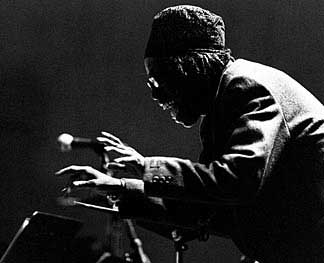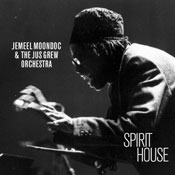

Courtesy of Jemeel Moondoc
Photo by Ben Barnhart

Eremite
A FIRESIDE
CHAT WITH JEMEEL MOONDOC
Jemeel
Moondoc was gracious enough to be a guest on the Roadshow as a DH for
Eremite Records. As part of our profile of the ten indie labels that are
worth more than their major label counterparts, the Roadshow has been
interviewing the heads of the labels in question. Eremite's label chief
is a low pro sort of fellow, so we will not mention his name, but rather
his label three times for emphasis. So Eremite, Eremite, Eremite. Back
to Jemeel Moondoc. If you don't know who he is, you should (Cecil Taylor).
Enough said. I'm done. Here he is, in living color, all unedited and in
his own words.
FRED JUNG: Let's start from the beginning.
JEMEEL MOONDOC: We were always hearing music, all the time, at the house,
all kinds of music, not all kinds actually, just Motown, Duke Ellington,
Billie Holiday, Count Basie, stuff like that. I started playing a little
bit of piano really early like when I was seven or eight at the church.
I used to be dragged to the church and a lot of times, I would just go
off by myself to the basement and there was some pianos and just play
those. I wanted to play clarinet and I actually started playing clarinet
on my own for a little bit. But when I went to high school orchestra,
I played flute there. I had never played flute before, but they gave me
a flute. So anyway, then I started playing alto probably around fifteen
or sixteen, maybe even seventeen. The alto just resounded throughout my
body. It was very cool and it was this incredible feeling. It just vibrated
through my whole being, so I thought that that was pretty cool. I played
a little bit with a local band and graduated from high school and started
playing around. The rest is history. That's the way it started.
FJ: You were a former student of Cecil Taylor.
JEMEEL MOONDOC: Yeah, I studied with Cecil. I went and studied with Cecil
at, he was up at the University of Wisconsin for a while. I forget what
year it was. I think it was '69 or '70. Then I went to Boston. I played
a lot around with local bands. But then Cecil went to Antioch. I think
it was around '71 or '70 and I went to Antioch. I went there to study
with Cecil. Cecil was there for two years and so I was there for two years
also. I think that was about '72. When that program was over, I came to
New York City. I learned the art of improvisation.
FJ: How does the art of improvisation Cecil Taylor style differ from the
art of improvisation Tommy Flanagan style?
JEMEEL MOONDOC: Well, I probably won't be able to say anything that will
change anybody's conception, Fred, of what improvisation is. What I do,
one of the things that was exciting to me when I first heard Cecil and
the freedom by which one can play music and creating this artwork and
so the concept of being able to just play, making a constructive musical
framework without using preconceived tonal constructions and various other
standard pieces of framework that is standard for what is now called improvisation.
FJ: What was the music of the day when you moved to New York in the Seventies?
JEMEEL MOONDOC: It was like that. It was like bebop. It was like bebop
city. I didn't have any idea. I heard Thelonious Monk at the Village Vanguard
and just listened to all this stuff happening. It was so exciting. Thinking
back, I didn't really come here for all of that. What attracted me was
the city itself, the vibrancy of it, the hugeness of it, the freedom of
it. I just came to New York. I didn't know really what was going on musically
in this place. Like I said, when I got here it was pretty much like it
is now, bebop, creative music itself. I lived in New York City and played
in different places out of the ordinary because we couldn't play anyplace
else. I think that is something that has been going on in New York City
for an awful long time, alternative performance spaces that feature alternative
music. What we do is basically considered alternative music.
FJ: Alternative to whom?
JEMEEL MOONDOC: It seems to me that there is an established power that
creates these kinds of political tensions and undertones by which one
chooses to participate in. My thing is to do what I do and try to get
paid and try to get my music out. It's tough. But my concern is the establishment,
the powers that may be are always going to be there and I'm not shooting
from the hip or nothing like that. I'm just doing what I do and people
listen.
FJ: Does it get tiring to swim against the current?
JEMEEL MOONDOC: No, I don't know. I haven't looked at it. I know what
it is that I want to do at this point. My God, I am old enough now to
understand that what I want to do is not established. I am really comfortable
with that in terms of my own ego and in my own self. I feel very good
about what I have accomplished so far because we have accomplished some
things.
FJ: Let's touch on Ensemble Muntu, a quartet with William Parker, Rashied
Rakr, and Roy Campbell.
JEMEEL MOONDOC: I met with William almost directly when I first came to
New York. I had a loft on Canal Street at that point and just kind of
played. I think I met Roy later through William because my first band
that I really put together was with a quintet. The quartet that you are
talking about just kind of came together in the late Seventies. But we
managed to do a lot of playing. We just managed to do a lot of playing.
I met Rashied through Danny Carter or Denis Charles or somebody like that.
We used to go and just play, just us four. We used to go to this place
on Broadway. I knew these people and she gave me the key. There was a
piano there, so we used to go everyday almost and just play. We didn't
have no gigs. We did some gigs. This went on for months and months.
FJ: Seems less complicated.
JEMEEL MOONDOC: That's right. Not even understanding what we were doing,
we were accomplishing this incredible, improvisational communication between
each other that I thought was really, really phenomenal.
FJ: What elements need to be in place for the music to get to another
level?
JEMEEL MOONDOC: That this time, this going to be new. So we come together
to create some new music and that is the attitude that you bring with
it, that this is going to be new. This is going to be something like you
never heard before in your life. This is something you've never even played
before in your life. A lot of times, that don't happen, but a lot of times,
it does.
FJ: Let's talk about your three recordings on the Eremite label. First,
Tri-p-let.
JEMEEL MOONDOC: Tri-p-let, I think I recorded that, I had been playing
a lot in Boston area with John Voigt, the bass player. I did a gig up
there with John Voigt and Andrew Cyrille and so after that, me and John
Voigt, we used to play together all the time whenever I would come up
there. I think this was around the same time that Eremite Records was
just getting started. Laurence Cook had stopped working with Bill Dixon,
who is another teacher of mine, but we just did some gigs together, myself,
John Voigt, and Laurence Cook. That resulted in Tri-p-let. Tri-p-let is
a studio thing and I hadn't been in the studio in so long and so when
they said, "Do you want to do this thing?" I said, "But I want to do it
in the studio." So that is why that one is in the studio.
FJ: You followed that with Fire in the Valley.
JEMEEL MOONDOC: Live at the Fire in the Valley, you can see that it is
two different approaches to the same thing. Fire in the Valley is basically
a free improvisational performance, whereas, Tri-p-let is more or less,
it is free improvisation, but we had specific themes, melodic structure
that we worked on. I wrote all of those pieces and to me, I just kind
of revisited the format. I write. I write a lot. If you look at Tri-p-let,
studio recording and you look at Fire in the Valley, live recording, if
you listen to Judy's Bounce (Soul Note), live recording, Fire in the Valley
trio, totally free, I mean of course, I had some things that I was thinking
about as the performance was being performed. Now, Tri-p-let, studio,
improvisation of written themes. Now, Judy's Bounce, performance, improvisation
off written themes. Now, with all three of those, you have a combination
of everything.
FJ: What setting are you most comfortable in?
JEMEEL MOONDOC: I prefer live improvisation from written themes. That
is the kind of improvisation you learn from Bill Dixon and Cecil Taylor.
You learn how to improvise themes and then you learn how to go from one
theme to the other.
FJ: And your latest on Eremite, New World Pygmies, featuring William Parker.
JEMEEL MOONDOC: Oh, that was so much fun, Fred. That was incredible. Same
thing. William wrote some pieces and I wrote some pieces and then it went
together and what was so wonderful to me about it was it went from everything
I had ever experienced in music, everything, including when I first met
William Parker back in '71. It was one of those kinds of trips, like a
really wonderful trip.
FJ: And the future?
JEMEEL MOONDOC: I'm just releasing my orchestra on Eremite. It is going
to be called Spirit House and that was a live performance in Massachusetts
this past spring with my orchestra. I think it was twelve pieces or eleven
pieces. I forget. And also, releasing a quintet with Khan Jamal with John
Voigt included. That was a live recording at this year's Vision Festival.
That is coming out, I think both of those things are coming out at the
same time in about ninety days or so. Then me and William is going on
the road. This thing starts around the first of November and it goes through
the fifth or sixth of November. We're going to go up to Montreal and the
University of Wisconsin and we're going to be in Chicago.
FJ: Anything more west? Something around the Los Angeles metropolis.
JEMEEL MOONDOC: (Laughing) No.
FJ: Yet another reason for me to pack my bags.
JEMEEL MOONDOC: Yeah, I know. I think we're getting as far as Minnesota.
That is as far west as we're going to get.
Fred Jung is the Editor-In-Chief and adopted son of Steven Speilberg.
Email Him.